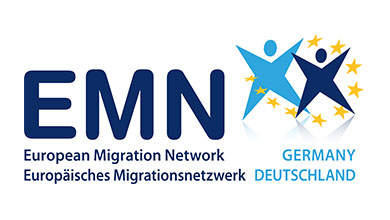Labour Market Integration of Third-Country Nationals ,
 Source: BAMF
Source: BAMF
The integration of migrants into the labour market plays a central role for state-led integration efforts in Germany. This applies both to newly arrived migrants as well as to third-country nationals that have been living in Germany for a longer time already or have been born here.
In three chapters the study presents
- legal and organisational framework conditions for labour market integration and statistics on the status of third-country nationals’ participation in the labour market,
- government measures at the federal level to improve the labour market integration of third-country nationals, and
- initiatives and measures by companies and private-sector associations to improve the recruitment, arrival and retention of international employees.
Measures and framework conditions for the labour market integration of asy-lum-seekers, refugees and students are not touched upon in this study.
Legal framework conditions
Labour market integration of third-country nationals with access to the labour market is an issue for several areas of German law (residence law, social security law etc.). The provisions on active employment promotion contained in the Second and Third Book of the Social Code play a key role. They aim at bringing unemployed, including third-country nationals that fulfil the respective access requirements, (back) into employment. In addition, the Residence Act contains provisions on Federal measures to promote labour market integration, for example the vocational German language promotion.
Current status of labour market integration of third-country nationals
The labour market participation of third-country nationals in general is still below the average of German society at large. While the number of third-country nationals holding employment subject to social security contributions rose considerably between 2014 and 2017, the employment rate fell during the same period due to higher immigration, especially of asylum-seekers.
Government measures
In addition to the provisions governing active labour market policy, there are numerous government measures to improve third-country nationals’ labour market chances. They focus, for example, on education and training, strengthening job-related competences and soft skills, information and advice, anti-discrimination and diversity measures at the workplace, tailor-made measures to improve labour market and work-place integration, incentives to take up work or provide a job and measures to support self-employment.
Integration in the workplace and private sector measures
Depending on the region and sector in which companies are doing business, they may face problems finding new employees. International recruitment is one of numerous strategies they employ in this regard. Experiences with international recruitment differ by regions within Germany, sectors and corporate departments.
Integration into the workplace takes place on site in the companies and institutions themselves. Concrete measures taken by numerous companies to ensure the workplace integration of international recruits include the provision of information about working and living in Germany as well as about the place where the company is located and the company itself, support in dealing with entry formalities and coping with everyday life after entry, the establishment of integration officers and/or mentoring programmes, company-specific qualification and training measures and diversity management and anti-discrimination measures.
Challenges
There are several challenges to the integration of third-country nationals into the German labour market.
- The labour market participation of third-country nationals has been below the average for years, as both lower employment and higher unemployment rates show. This is explained, for example, with insufficient or outdated professional experience, but also with insufficient specific knowledge of the German labour market and the respective vocational structures, real institutional or subjectively perceived discrimination and crowding-out effects as well as structural change, which affects third-country nationals more severely.
- Empirical studies recurrently show that applicants with a migration background (thus also third-country nationals) are subject to discrimi-nation when they enter the labour market or look for a new job.
- Workplace integration may run into potential hurdles, for example a lack of preparation for living and working conditions in Germany.
Working Paper 82 was authored as part of the European Migration Network (EMN).
Authors of the study: Julian Tangermann, Janne Grote
